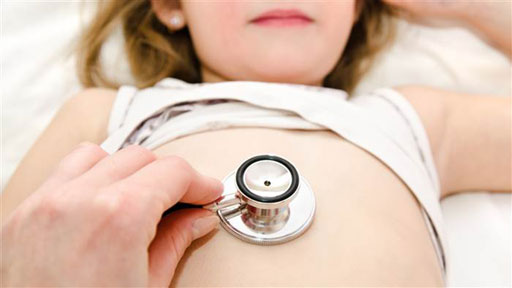Everything from HIV to cholesterol
The American Academy of Pediatrics released new screening
recommendations early last week, encouraging more preventive testing in
children, everything from HIV to cholesterol.
The well-child preventive tests include:
Cholesterol
Children ages 9-11 should be screened for high blood cholesterol
levels.Atherosclerosis, the fatty gunk in arteries that causes heart
attacks, strokes, and other serious problems, begins while we're still
young. The screening change reflects concerns about the growing epidemic
of obesity in children.
 "The
goal is to identify risk factors early on, so we reduce their heart
disease risk as adults," says author of the Paediatrics report, Dr.
Geoffrey Simon, Nemours DuPont Paediatrics in Wilmington, Delaware,
adding "it has nothing to do with whether your kids are obese or not." "The
goal is to identify risk factors early on, so we reduce their heart
disease risk as adults," says author of the Paediatrics report, Dr.
Geoffrey Simon, Nemours DuPont Paediatrics in Wilmington, Delaware,
adding "it has nothing to do with whether your kids are obese or not."
If a 10-year-old has high cholesterol, what happens next?
Usually lifestyle and diet changes are recommended. There's a small
percentage of kids whose cholesterol is just through the roof. It's not
that they're overweight; genetically they have this condition.
Medications like statins should be prescribed only in extreme cases.
"It is important to identify those children because you also may
identify parents who may be at even more immediate risk for heart
disease," says Dr. Stephen Daniels, spokesperson of the American Heart
Association and chair of the Department of Pediatrics at the University
of Colorado. "It is a way to not just focus on children but the whole
family."
Congenital heart disease
A screening for critical congenital heart disease using pulse
oximetry has been added and should be performed in the hospital before
newborn discharge.
Anaemia
A risk assessment is added at 15 and 30 months for hematocrit or
hemoglobin screening to help detect anemia, an iron deficiency.
Teeth
To help reduce dental cavities, the top chronic disease affecting
young children, a recommendation has been added for fluoride varnish
applications, given in the doctor's office, from 6 months through 5
years.
A smear (the size of a grain of rice) of toothpaste should be used up
to age 3. After the 3rd birthday, a pea-sized amount may be used.
Parents should dispense toothpaste for young children and supervise and
assist with brushing.
Over-the counter fluoride rinse is not recommended for children
younger than 6 years due to risk of swallowing higher-than-recommended
levels of fluoride.
HIV testing
Teens as young as 16-18 are advised to have HIV screening at least
once in a health care setting, when the prevalence of HIV in the patient
popularion is more than 0.1 percent.
One in 4 new HIV infections are in 13-24 year olds and 60 percent of
teens who are infected don't know it.
In areas of lower community HIV prevalence, routine HIV testing is
encouraged for all sexually active adolescents and those with other risk
factors for HIV.
"We decided on the range of 16 to 18 based on where you are," says
Simon. "Because of local privacy laws, sometimes you can't give results
confidentially to patients under 18."
While some parents may be uncomfortable with HIV screening for their
teens, "it is a good idea," says Dr. Lee Beers, Medical Director for
Municipal and Regional Affairs, Children's National Health System.
"We know from national surveys that adolescents are having sex and
are not good about having protection," says Beers. "They don't think
long term."
Depression
Suicide is the leading cause of death in adolescents, so depression
screening is advised every year for ages 11-21.
Drugs and alcohol
The CRAFFT (Car, Relax, Alone, Forget, Friends, Trouble)
questionnaire is recommended for all adolescents.
Doctors will ask teens:
• Have you ever ridden in a CAR driven by someone (including
yourself) who was "high" or had been using alcohol or drug?
• Do you ever use alcohol or drugs to RELAX, feel better about
yourself, or fit in?
• Do you ever use alcohol/drugs while you are by yourself, ALONE?
• Do you ever FORGET things you did while using alcohol or drugs?
• Do your family or FRIENDS ever tell you that you should cut down on
your drinking or drug use?
• Have you gotten into TROUBLE while you were using alcohol or drugs?
Vision
The recommendation for routine vision screening at age 18 has been
changed, based on evidence showing that fewer new vision problems
develop in low-risk young adults.
Cervical dysplasia
Screening for the presence of pre-cancerous cells on the surface of
the cervix, only at 21 years (instead of risk assessment every year from
ages 11 through 21).
- Health Today
|

